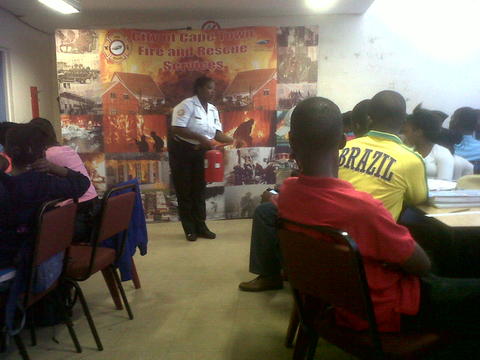

On Saturday 9 March, IkamvaYouth in partnership with Capitec presented a fire safety awareness workshop hosted by Mrs Nombeko Kopele (Public Education Officer) from the fire and rescue services in Ottery, Cape Town. In December 2012, close to a 1000 shacks burnt down in Khayelitsha with countless people being displaced and with winter approaching, a time when the risks of fires increase, it was an opportune time to educate our learners about the dangers that fires pose, but also give them tips on how to avoid these fires.
The presentation were in two parts, first with the grade 10, 11 and 12s and then with the grade 8 and 9s. The reason for this split was because different aspects were discussed with the different age groups. Although the main focus of the workshop was fire safety awareness, it also allowed the presenter to speak to the older kids about the different careers within fire and rescue. This was very exciting for the ikamvanites because they found out that the training to become a fire fighter or paramedic is only 6 months and that it was really physical. They had a lot of questions to ask and the presenter was very knowledgeable and answered all their questions. Lwazi Fanana, a grade 11 learner, said afterwards that he might consider a career in the fire and rescue field. Another learner Sipho Nqgayimbana, grade 12, asked about the different careers within the fire and rescue fields and the presenter said that careers vary from administration, management, medical to paramedical and firefighting, etc., and that there are lots of skills shortages in this career field and with that a lot of opportunities for young people to join.
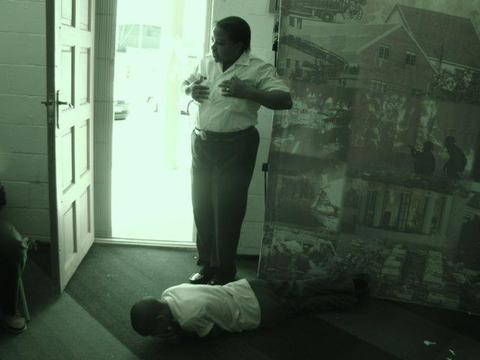
For the younger grades, the focus were more on fire prevention tips, what to do in case of a fire or burn injuries and who to contact when you see a fire. The session with them were more interactive and the ikamvanites were able to simulate scenarios, like rolling on the ground when you catch fire, and were shown charts of what to do. All the ikamvanites were told where their closest fire station is and were told to call 107 or 0215901900 in case of a fire or any other emergency. Everyone had a lot of questions for Mrs Kopele and as with the other group; she was able to answer every question.
We would like to thank the City of Cape Town and in particular Mrs Nombeko Kopele and Mr Abdusalaam Allie, Capitec and everyone that assisted with this workshop.
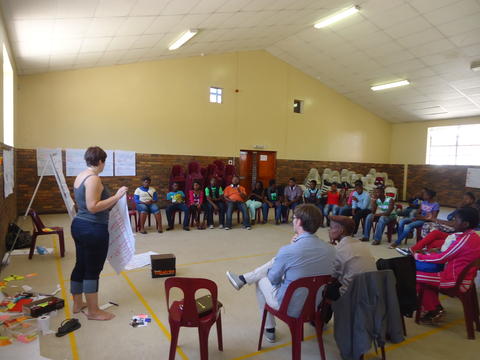

The weekend consisted of planning for 2013 as well as an election to choose the new branch committee as well as choosing the different heads of the different portfolios. Present were more than 30 learners from different grades and tutors and they all had a chance to discuss the decision making, planning and electing the branch committee.
The Main goal of our SPW was to elect a branch committee (in charge of roles and portfolios) and for new volunteers (grade12 from last year returning) to take ownership of programme and become part of the management team. It was also a great weekend for the leaner reps and tutors to get to know each other better.
On Saturday we discussed the year program and we also had a look back at what happened in 2012. The morning started off with an introduction and the group explaining what their expectations of the weekend will be, we then discussed what happened in 2012 and then we ended with looking at what IkamvaYouth is doing well, what challenges we are facing, what IkamvaYouth is offering learners and the community and what we can do to improve the programme. We had a lot of first time branch committee members, but the rest of the group made them all feel included and welcome.
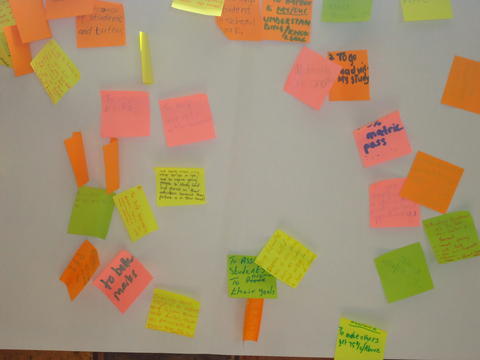
On Sunday the election took place and everyone had a chance to vote for the different nominees. The nomination and election process were very democratic and the nominees had to explain to the group why they were best suited for the different portfolios. The different portfolios were Tutoring, Volunteer Coordination, Career Guidance, Media, Image and Expression, Computer Literacy, Health and Life Skills and Alumni.
The different portfolio members also had to discuss their portfolios and present a plan of action for the group and will need to present this plan of action to all the Ikamvanites at Makhaza. They had to present their goals, when the goals should be reached and by whom. Emihle, a grade 8 learner and newly appointed portfolio member said that the weekend was a dream come true and that she enjoyed the interaction and discussions that took place and that she is really happy and proud for being chosen as part of the health and life skills portfolio.

Mandisi Gladile, a tutor says, “the weekend was really informative and made me realise the value IkamvaYouth adds not only to the learners but also the community and I feel really inspired for the things that we have planned for 2013.”
strategic_planning_week_2013.pdf
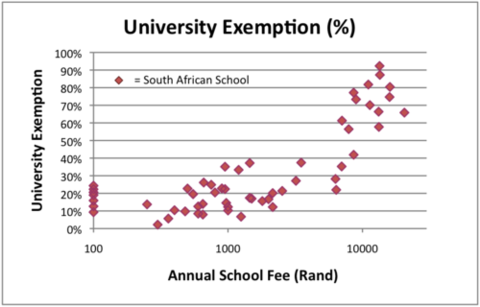
Just over a year ago I was approached by Andrew Einhorn, a UCT grad student, who was interested in implementing an online maths program at Makhaza. All he needed was access to the lab, access to a class and a tutor. A year down the line not only he has completely revamped two of our branches labs in Makhaza and Nyanga, established a formal Khan Academy program in these branches (as well as other locations in Cape Town and rural Eastern Cape), but has produced results at very low costs, and is piloting in schools for 2013.
His passion for creating high impact and stimulating learning environments in township and rural locations often only privy to the wealthy few has seen him start Numeric, an NGO interested in finding ways to bring Khan Academy to South Africa and make it a useful resource to both teachers and learners. He presented an inspiring TEDxUCT talk last year outlining the background, as well as the impact and results Numeric has had. He also posted the following blog on the Khan Academy website:
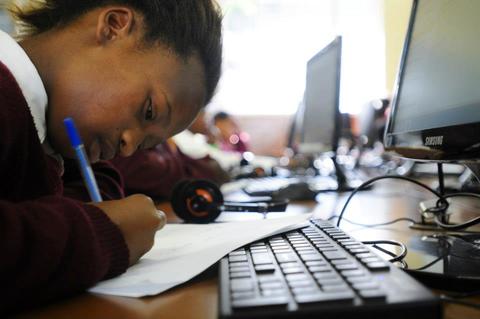
A little over 15 months ago, we started an experiment. We wanted to know if Khan Academy was viable in township (slum) areas in South Africa and if so, what type of impact it might have on numeracy. Numeracy in South Africa is astonishingly weak, with just 2% of Grade 9s scoring over 50% on the annual national assessments in 2012.
And so we set out to see if Khan Academy might be used as a catalyst for change. But before I expound on the results of this experiment, I ought perhaps give a little more background on the environments we’re working in.
Townships in South Africa are not unlike the favelas of Brazil or the slums bordering Delhi and Calcutta in India. They are urban areas that were, until the end of Apartheid in 1994, reserved for non-whites, but have now become residential hubs for the urbanizing masses. They are typically built on the periphery of cities and tend to be characterized by high population density, poverty and unemployment. Picture a ramshackle of makeshift houses constructed out of corrugated iron, wood scraps and cardboard, jigsawed together into a gigantic maze 5 miles wide and 10 miles across. At the risk of generalising grossly, that’s more or less the picture I want you to have in mind as you read this article.
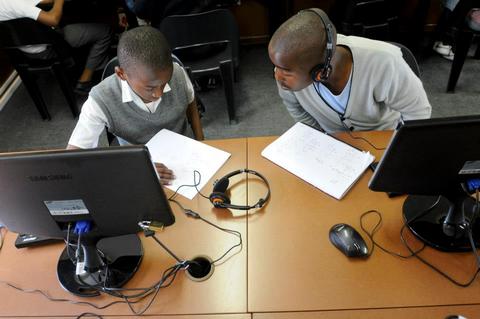
Now, townships in South Africa get a bad rap. They are viewed as ‘dangerous’ places and it is considered unwise to visit them unless you know someone there, or visit them as part of a ‘township tour’. Yet while crime rates in these areas are often high, the reputation does not do justice to the vibrant and persevering people who inhabit them. In particular, townships are YOUNG! On any given day, around two o’clock in the afternoon, the streets flood with uniformed, backpack-toting children on their way home from school. And despite having barely two pennies to rub together, they are meticulously dressed – shiny black shoes, starched white collars – and have aspirations to match. Most of the children in South Africa live in some form of township, which means that children growing up in these environments constitute the better part of the future of our country.
And yet it is supremely difficult to convince our best teachers to go and work in these areas. They are offered good jobs in well-resourced schools most often located in the wealthy suburbs of the cities. Principals at these schools compete fiercely for their skills. And this is as it should be. But it also entrenches the educational bias whereby a child’s access to quality education is directly proportional to the wealth of their family (see chart below).

* University exemption rate refers to the percentage of learners who attain the academic marks in their final year of school that are necessary to gain access to South African universities.
So Numeric’s experiment was to see whether we could use Khan Academy, in conjunction with a slightly less skilled (and often unqualified) math coach, to create the high impact and stimulating learning environments enjoyed by kids living in wealthier suburbs.
The opportunity provided by Khan Academy premised on the following: Videos do not argue about where they are played; they are unaffected by crime and environment. Appropriately licensed, they do not cost anything. They do not grow weary, skip class, or grow jaded. Instead, they convey their message enthusiastically, faithfully, clearly – time and time again. A child may watch just as many videos as he/she has appetite for, and need never feel limited by the dragging on of a boring class or an inept teacher. For many children in South Africa, a Khan Academy video will be their first exposure to what we might term ‘world class instruction’. When complemented by the exercises on the Knowledge Map, Khan Academy becomes a powerful tool for turning the tide on numeracy in South Africa.
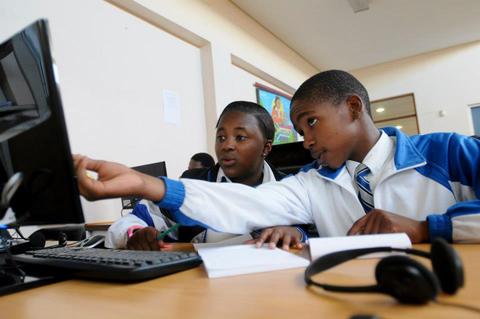
So what were the results of the experiment? Well, it’s probably too early to draw any major conclusions, but we do have a few figures we’d like to share. We currently run 7 Khan Academy classes across 3 different hubs in the Eastern and Western Cape provinces of South Africa. The first pilot group of 20 Grade 9s has just completed its first twelve months of Khan Academy and their numbers are as follows:
* Total Khan Academy hours delivered: 2220
* Total Problems Solved: 27,988
* Total Problems per learner: 1399
* Total Khan Modules Complete: 1232
* Average Modules per learner: 62
Bearing in mind this is an afterschool programme, these are 27,988 math problems that would not otherwise have been attempted. The 62 modules completed by the average learner constitute 62 gaps that those learners have filled. But it’s more about just the numbers; it’s about creating excitement and enthusiasm around learning. This is hard to convey in words, but perhaps a picture will suffice.
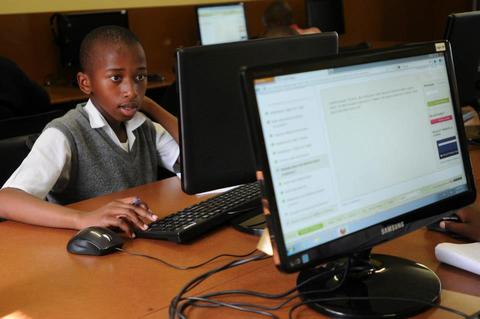
As we always say to our coaches, the tragedy in South Africa is not so much that kids don’t want to learn. It’s that some kids DO want to learn, but can’t. Khan Academy provides us one way to give these kids a world-class education without having to magically replenish our nation’s supply of teachers. And who knows, perhaps one day these kids will become the inspirational and talented teachers we have waited for for so long!
—-
Andrew Einhorn is the founder and current CEO of Numeric.org. His TEDx talk on Numeric.org and Khan Academy is available here.
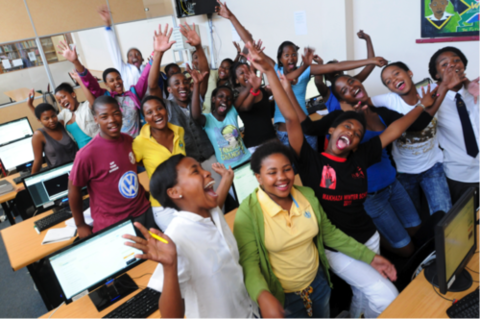
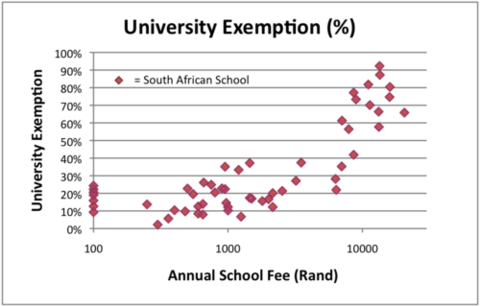
Just over a year ago I was approached by Andrew Einhorn, a UCT grad student, who was interested in implementing an online maths program at Makhaza. All he needed was access to the lab, access to a class and a tutor. A year down the line not only he has completely revamped two of our branches labs in Makhaza and Nyanga, established a formal Khan Academy program in these branches (as well as other locations in Cape Town and rural Eastern Cape), but has produced results at very low costs, and is piloting in schools for 2013.
His passion for creating high impact and stimulating learning environments in township and rural locations often only privy to the wealthy few has seen him start Numeric, an NGO interested in finding ways to bring Khan Academy to South Africa and make it a useful resource to both teachers and learners. He presented an inspiring TEDxUCT talk last year outlining the background, as well as the impact and results Numeric has had. He also posted the following blog on the Khan Academy website:

A little over 15 months ago, we started an experiment. We wanted to know if Khan Academy was viable in township (slum) areas in South Africa and if so, what type of impact it might have on numeracy. Numeracy in South Africa is astonishingly weak, with just 2% of Grade 9s scoring over 50% on the annual national assessments in 2012.
And so we set out to see if Khan Academy might be used as a catalyst for change. But before I expound on the results of this experiment, I ought perhaps give a little more background on the environments we’re working in.
Townships in South Africa are not unlike the favelas of Brazil or the slums bordering Delhi and Calcutta in India. They are urban areas that were, until the end of Apartheid in 1994, reserved for non-whites, but have now become residential hubs for the urbanizing masses. They are typically built on the periphery of cities and tend to be characterized by high population density, poverty and unemployment. Picture a ramshackle of makeshift houses constructed out of corrugated iron, wood scraps and cardboard, jigsawed together into a gigantic maze 5 miles wide and 10 miles across. At the risk of generalising grossly, that’s more or less the picture I want you to have in mind as you read this article.

Now, townships in South Africa get a bad rap. They are viewed as ‘dangerous’ places and it is considered unwise to visit them unless you know someone there, or visit them as part of a ‘township tour’. Yet while crime rates in these areas are often high, the reputation does not do justice to the vibrant and persevering people who inhabit them. In particular, townships are YOUNG! On any given day, around two o’clock in the afternoon, the streets flood with uniformed, backpack-toting children on their way home from school. And despite having barely two pennies to rub together, they are meticulously dressed – shiny black shoes, starched white collars – and have aspirations to match. Most of the children in South Africa live in some form of township, which means that children growing up in these environments constitute the better part of the future of our country.
And yet it is supremely difficult to convince our best teachers to go and work in these areas. They are offered good jobs in well-resourced schools most often located in the wealthy suburbs of the cities. Principals at these schools compete fiercely for their skills. And this is as it should be. But it also entrenches the educational bias whereby a child’s access to quality education is directly proportional to the wealth of their family (see chart below).

* University exemption rate refers to the percentage of learners who attain the academic marks in their final year of school that are necessary to gain access to South African universities.
So Numeric’s experiment was to see whether we could use Khan Academy, in conjunction with a slightly less skilled (and often unqualified) math coach, to create the high impact and stimulating learning environments enjoyed by kids living in wealthier suburbs.
The opportunity provided by Khan Academy premised on the following: Videos do not argue about where they are played; they are unaffected by crime and environment. Appropriately licensed, they do not cost anything. They do not grow weary, skip class, or grow jaded. Instead, they convey their message enthusiastically, faithfully, clearly – time and time again. A child may watch just as many videos as he/she has appetite for, and need never feel limited by the dragging on of a boring class or an inept teacher. For many children in South Africa, a Khan Academy video will be their first exposure to what we might term ‘world class instruction’. When complemented by the exercises on the Knowledge Map, Khan Academy becomes a powerful tool for turning the tide on numeracy in South Africa.

So what were the results of the experiment? Well, it’s probably too early to draw any major conclusions, but we do have a few figures we’d like to share. We currently run 7 Khan Academy classes across 3 different hubs in the Eastern and Western Cape provinces of South Africa. The first pilot group of 20 Grade 9s has just completed its first twelve months of Khan Academy and their numbers are as follows:
* Total Khan Academy hours delivered: 2220
* Total Problems Solved: 27,988
* Total Problems per learner: 1399
* Total Khan Modules Complete: 1232
* Average Modules per learner: 62
Bearing in mind this is an afterschool programme, these are 27,988 math problems that would not otherwise have been attempted. The 62 modules completed by the average learner constitute 62 gaps that those learners have filled. But it’s more about just the numbers; it’s about creating excitement and enthusiasm around learning. This is hard to convey in words, but perhaps a picture will suffice.

As we always say to our coaches, the tragedy in South Africa is not so much that kids don’t want to learn. It’s that some kids DO want to learn, but can’t. Khan Academy provides us one way to give these kids a world-class education without having to magically replenish our nation’s supply of teachers. And who knows, perhaps one day these kids will become the inspirational and talented teachers we have waited for for so long!
—-
Andrew Einhorn is the founder and current CEO of Numeric.org. His TEDx talk on Numeric.org and Khan Academy is available here.

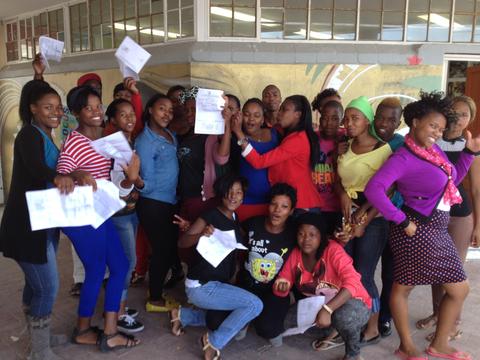
Right now, learners all across the country are either celebrating or commiserating after receiving their matric results. And the national numbers seem to suggest that whether matriculants are partying or weeping has a lot to do with their level of economic privilege and the resources of their schools.
But in townships around South Africa, a very special group of matriculants with a whole lot of reasons to celebrate are bucking that trend, and proving that the seemingly impossible is possible with hard work and a little help from one’s friends.
These young people are the ikamvanites, and this week they overcame all the challenges of their circumstances to achieve a national pass rate of 89% and an incredible 100% pass rate in both Gauteng and KwaZulu-Natal – results far more privileged learners would be proud of!
Those aren’t just 30% passes either: 87% of ikamvanites achieved the Bachelor or Diploma passes they need to take their education to the next level and access the kinds of opportunities they need to fulfil their dreams of supporting and uplifting their families. Most remarkable of all, these learners aren’t waiting to uplift their communities, and 72% have already become volunteer tutors for the next cohorts of learners; ensuring the exponential replication of the IkamvaYouth model and reach.
Mamphela Ramphele reports that she’s thrilled to witness IkamvaYouth’s incredible growth and enormous impact. “IkamvaYouth saves learners from despair and grinding poverty and most importantly gives them hope… the organisaton’s sustainable model, extra-ordinary commitment and exceptional results inspire our nation.”
Talent Chinogureyi, an ikamvanite in Chesterville, KZN, enthused, “I want to go to university and study further so that when I graduate I can be the one to eradicate poverty at home.” She achieved a Bachelor pass and a distinction for Accounting and has been accepted to study a B Com at prestigious private Johannesburg institution St Augustine College.
At the Masiphumelele branch of IkamvaYouth in the Western Cape, one learner overcame even more hardship than most. “The majority of people tend to think that once you have fallen pregnant, it is the end of the world. I have proved to them that there is still hope. Through all the hardships, I made it. I got a Bachelor pass… I say B for my Baby,” said Neliswa Mnaheni, who hopes to study Marketing next year.
While this has been a time of celebration for most ikamvanites, it has been very challenging for some. Thankfully, everyone that did not pass is eligible for supplementary exams, and IkamvaYouth will be supporting these learners to ensure that they are well-prepared to excel. Others were traumatised by the ongoing illegal practice of withholding results due to unpaid school fees or outstanding textbooks. While IkamvaYouth was able to step in and support families with school fee contributions thanks to its donors, there are thousands of learners across the country who do not have access to this kind of support. “The no-fees-no-report practice is unjust, humiliating and illegal and needs to end”, says Joy Olivier, director of IkamvaYouth. “Our learners need these results in order to realise their dreams and schools need alternative avenues to access much-needed funds”.
IkamvaYouth’s work with the class of 2012 is also far from over. While many of those who passed have already been accepted by the country’s top universities, there is still work to be done to ensure that none of the class of 2012 become unemployed. The next step is ensuring that all these learners access tertiary education, training, internships, learnerships or employment. “IkamvaYouth will continue to support all our 2012 matrics as they access quality post-school opportunities and become tutors; enabling the following years’ learners to do the same,” says Zamo Shongwe, IkamvaYouth’s national coordinator.
IkamvaYouth invites everyone to get involved. There are branches in the Western Cape (Khayelitsha, Nyanga and Masiphumelele); KZN (Chesterville and Umlazi) and Gauteng (Ivory Park, and Ebony Park), North West (a new branch opening in Potchefstroom) and the Eastern Cape (a new branch opening in Grahamstown). IkamvaYouth has maintained a matric pass rate of between 85 and 100% each year since 2005, and true credit for these results must go to the learners, volunteers, the branch teams, partner organisations and donors.



My name is Rhondashein Ntebaleng Morake and this is my story.
I grew up in the dusty township streets of Kaalfontein Midrand. My mother, being part a generational cycle of domestic workers in my family, sacrificed a lot of things of things to enable me to escape this cycle and have better opportunities. She infused me with pride and dignity and allowed me to dream bigger than our two room rented shack. Having a strong work ethic and being intrigued by history, law and politics, I took the first step of rejuvenating myself by joining IkamvaYouth Gauteng.I perceive education as a pre-requisite for sustainable development and that is why I decided to join IkamvaYouth. Education is the foundation of every society and an essential element to build a secure livelihood. It is the only thing that can catapult me, a daughter of a domestic worker and transform me to make gigantic impacts in our country and continent, by stimulating entrepreneurship, nourishing education and tackling crime through my desired career path (Law and Politics).
IkamvaYouth helped me academically and made me a strong academic student. Through its help, I was able to be in the academic top 5 in my school and be awarded the Academic Excellence Award for Grade 12, 2012 by Tsosoloso Ya Afrika High School. I was recently selected to part of be part of the Urban Transformers 2012-2013 by Rethink Leadership as I am inspired by ethical leadership and I speak up in favour of the voiceless. I have also managed to get 4 Distinctions at Matric (2012) and this is a dream come true for me. The fact that I got such good results means that my future has taken a completely different route and my mother no longer has to work as a domestic worker for much longer.
Although my mother is financially disadvantaged, I want to study BA Law with Political Science, Philosophy and International Relations at the University of Cape Town or the University of the Witwatersrand. When I wrote this article about myself, I realised that I aspire to represent the best of Africa’s produce for she is not destitute nor cursed or relegated to occupying the position of orphan continent. I have a clear vision of where I am going, for I have invested in educating myself in preparation to make myself, community, country and continent a success.
My dream is to one day be the President of the Republic of South Africa and the Secretarial General of the United Nations. I want to thank IkamvaYouth for helping me to work towards my dreams.

(Ntebaleng Morake on the left, standing next to Asanele Swelindawo, also a holder of 3 distictions, on the right)
Once an Ikamvanite, always an Ikamvanite!
Proud Ikamvanite: Ntebaleng Morake


















 Lloyd Lungu
Lloyd Lungu